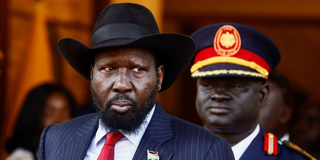Prime
President Kiir sacks South Sudan army chief in major purge

South Sudan's President Salva Kiir Mayardit.
What you need to know:
- The purge has marked a notable reorganisation of the leadership within South Sudan's security apparatus.
- In September, South Sudan pushed forward the general elections that were slated for December 2024.
South Sudan President Salva Kiir has removed army chief Gen Santino Deng Wol and the Governor of Bank of South Sudan Alic Garang from office.
The latest purge has targeted security and economy institutions in the country.
Garang has been replaced by Johnny Ohisa Damia, who previously held the same position while Gen Paul Nang Majok has been appointed the new military chief.
Wol was reassigned as the Undersecretary in the Ministry of Defence and Veterans Affairs, replacing Atak Santino Majak, who was relieved of his duties.
In a series of presidential decrees, President Kiir reshuffled key positions within South Sudan's military, financial, and administrative sectors, signaling a major shake-up in the country’s leadership.
The removal of the military head comes just months after police and spy chiefs were fired.
Samuel Yanga Mikaya, the First Deputy Governor of the Bank of South Sudan, has also been removed and replaced by Yeni Samuel Costa.
At the Ministry of Finance and Planning, Garang Majak was relieved of his duties as the First Undersecretary and Arop Nuoi Arop appointed to take over that role, reflecting part of broader efforts to enhance economic governance amid ongoing economic challenges.
However, the frequent changes could be a source of instability and lack of institutional memory with new entrants often having little time to deliver.
In the military, Gen Wol had been the Chief of Defence Forces, a position that has often seen a revolving door.
President Kiir had also fired the Inspector General of Police Gen Atem Marol and appointed Gen Abraham Peter Manyuat to the position.
The purge has marked a notable reorganisation of the leadership within South Sudan's security apparatus.
While President Kiir cited his constitutional authority to appoint and remove public officials, no official reasons were provided for the dismissals and reassignments.
The changes come at a time when South Sudan faces multiple challenges, including economic instability, ongoing security concerns, and the implementation of the 2018 Revitalised Agreement on the Resolution of the Conflict in South Susan (R-ARCSS).
South Sudan has sorely delayed on the reforms in the security sector, including the unification of the army factions that had fought each other before the 2018 peace deal that created a coalition government known as the Transitional Government of National Unity (TGoNU).
President Kiir’s government was forced to extend its mandate in September after the elections that were slated for December were pushed forward to February 2026.





